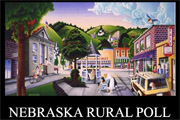Agricultural Economics, Department of

Nebraska Rural Poll
Date of this Version
2011
Document Type
Report
Citation
Center for Applied Rural Innovation, CARI Research Report (August 2011) 11-3, 38 pages
Institute of Agriculture and Natural Resources, University of Nebraska-Lincoln
Also available at https://ruralpoll.unl.edu/pdf/11community.pdf
Abstract
By many different measures, rural Nebraskans are positive about their community. Many rural Nebraskans rate their community as friendly, trusting and supportive. Most rural Nebraskans also say it would be difficult to leave their community. In addition, most rural Nebraskans disagree that their community is powerless to control its future.
Differences of opinion exist by the size of their community. Residents of smaller communities are more likely than residents of larger communities to rate their community favorably on its social dimensions and to have positive sentiments about their community. However, residents of larger communities are more likely than residents of smaller communities to say their community has changed for the better during the past year and will be a better place to live ten years from now.
Except for a few services that are largely unavailable in rural communities, rural Nebraskans are generally satisfied with basic community services and amenities. They are most satisfied with: fire protection, parks and recreation, library services, and religious organizations. On the other hand, at least one-third of rural Nebraskans are dissatisfied with the retail shopping, entertainment, streets and roads, restaurants, and arts/cultural activities in their community.
Few rural Nebraskans are planning to move from their community in the next year, but most of those who do plan to move expect to leave the state. Most young people who plan to move expect to leave Nebraska.
When asked about the impact of various economic development strategies, most rural Nebraskans believe strategies that assist small businesses and entrepreneurs would have a positive impact on their community. These strategies include: providing loans to small businesses and entrepreneurs in their community, developing a youth entrepreneurship program in their local school(s), and providing training or technical assistance to small businesses and entrepreneurs in your community. Promoting the development of wind energy, improving access to high-speed Internet, and providing tax incentives to companies that locate in the community are other strategies that most rural Nebraskans believe would have a positive impact on their community.
Included in
Agribusiness Commons, Agricultural and Resource Economics Commons, Civic and Community Engagement Commons, Community-Based Research Commons, Demography, Population, and Ecology Commons, Entrepreneurial and Small Business Operations Commons, Place and Environment Commons, Public Affairs, Public Policy and Public Administration Commons, Regional Economics Commons, Rural Sociology Commons

